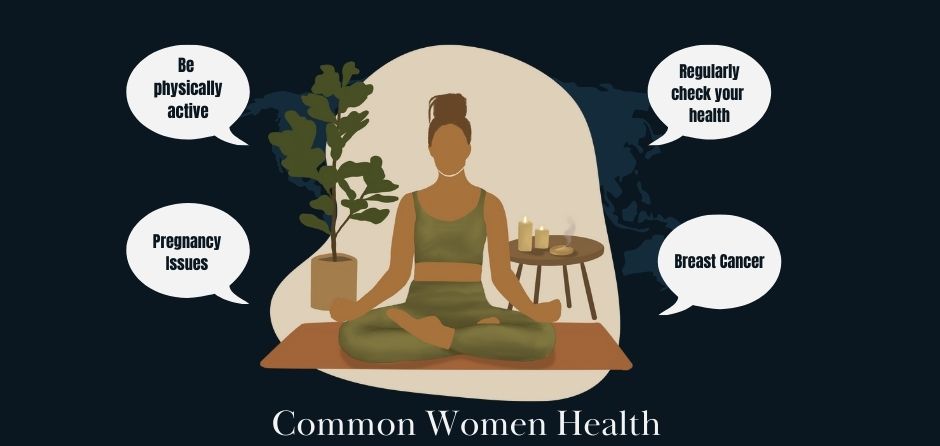Common Health Problems in Women

Introduction
Women regularly juggle a variety of duties and obligations in today’s fast-paced society, from managing houses to pursuing careers. Even if they’re doing very well in these areas, they occasionally disregard their health. The following piece wants to raise awareness of prevalent medical conditions that affect women, highlighting the value of early detection and self-care.
Women are more likely to suffer from certain health problems than men. Some of the most common health problems in women include:
- Heart disease: For women over 35, heart disease is the most common cause of death. It can be brought on by plaque accumulation in the arteries, which may interfere with the heart’s capacity to absorb blood.
- Stroke: A stroke occurs when the blood supply to the brain is interrupted. This can cause damage to brain tissue and lead to a variety of problems, including paralysis, speech loss, and cognitive impairment.
- Cancer: Breast cancer is the most common cancer among women, followed by lung cancer and colorectal cancer. Cancer is caused by the uncontrolled growth of abnormal cells.
- Osteoporosis: Osteoporosis is a condition that causes bones to become weak and brittle. This can increase the risk of fractures.
- Depression: Depression is a common mental health condition that affects an estimated 10% of women. It is characterized by feelings of sadness, hopelessness, and loss of interest in activities that were once enjoyable. R


Prevention
There are a number of things that women can do to prevent common health problems, including:
- Eating a healthy diet: Eating a healthy diet that is low in saturated and unhealthy fats and high in fruits, vegetables, and whole grains can help to reduce the risk of heart disease, stroke, cancer, and other chronic diseases.
- Exercising regularly: Exercise helps to strengthen the heart, lungs, and muscles, and it can also help to reduce stress and improve mood. Women should aim for at least 30 minutes of moderate-intensity exercise most days of the week.
- Maintaining a healthy weight: Being overweight or obese increases the risk of a number of health problems, including heart disease, stroke, cancer, and type 2 diabetes. Women should aim to maintain a healthy weight by eating a healthy diet and exercising regularly.
- Not smoking: Smoking is a leading cause of preventable death. It increases the risk of heart disease, stroke, lung cancer, and other health problems. Women who smoke should quit as soon as possible.
- Getting regular checkups: Seeing a doctor for regular checkups and screenings can help to detect health problems early, when they are most treatable.
Treatment
Treatment for common health problems in women varies depending on the specific problem. However, some common treatments include:
- Medication: Medication can be used to treat a variety of health problems, such as high blood pressure, cholesterol, depression, and pain
- Surgery: Surgery may be necessary to treat certain health problems, such as cancer, endometriosis, and fibroids.
- Lifestyle changes: Lifestyle changes, such as eating a healthy diet, exercising regularly, and quitting smoking, can also be effective in treating and preventing a number of health problems.
If you are concerned about a specific health problem, talk to your doctor. They can help you to determine the best course of treatment for your individual needs.

Top 5 benefits of Running
Reducing the risk of cancer
Improving cognitive function
Reducing the risk of type 2 diabetes
Improving sleep quality
Boosting the immune system
Running is a relatively inexpensive and accessible form of exercise. It can be done almost anywhere, at any time, and doesn’t require any special equipment.
If you are new to running, start slowly and gradually increase the distance and intensity of your runs over time. It is also important to listen to your body and take breaks when you need them.
What are the common symptoms of PCOS?
Irregular periods
- Hormonal changes, such as during puberty, pregnancy, and menopause
- Certain medical conditions, such as polycystic ovary syndrome (PCOS), thyroid problems, and diabetes
- Lifestyle factors, such as stress, excessive exercise, and significant weight loss or gain
- Medications, such as birth control pills, antidepressants, and steroids
Excessive hair growth
- Hirsutism is a common symptom of PCOS, affecting up to 80% of women with the condition.
- Excessive hair growth in PCOS can occur on the face, chest, abdomen, and back.
- The severity of hirsutism can vary from woman to woman.
- . Treatment for hirsutism in PCOS will depend on the underlying cause.
Acne and oily skin
- Acne is a common symptom of PCOS, affecting up to 80% of women with the condition.
- Acne in PCOS can be caused by a number of factors,
- Treatment for acne in PCOS will depend on the underlying cause. In some cases, no treatment is necessary. In other cases, treatment may involve medication, lifestyle changes, or surgery.
Conclusion
In a world that demands so much from women, prioritizing their health should be non-negotiable. By understanding these common health problems, women can proactively manage their well-being and lead healthier, happier lives.
FAQs
- What can I do to reduce my risk of cardiovascular diseases?
- Focus on a balanced diet and regular exercise.
- Monitor your blood pressure and cholesterol levels.
- Avoid smoking and excessive alcohol consumption.
- When should I start breast self-exams?
- You can start as early as your teenage years.
- Perform self-exams monthly, ideally a few days after your period.
- What are the common symptoms of PCOS?
- Irregular periods
- Excessive hair growth
- Acne and oily skin
- How can I manage stress effectively?
- Practice mindfulness and meditation.
- Engage in hobbies that bring you joy.
- Seek support from friends and professionals if needed.
- Are there any lifestyle changes to alleviate endometriosis pain?
- Maintaining a balanced diet.
- Exercising regularly.
- Exploring pain management options with your healthcare provider.’

